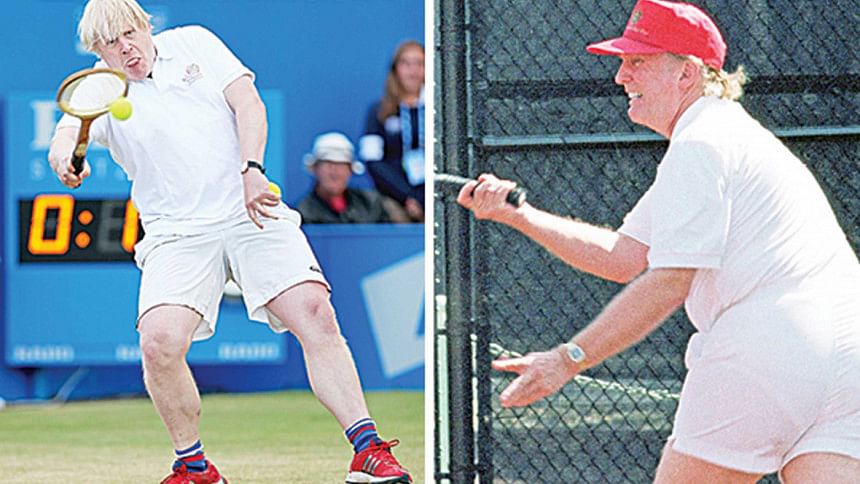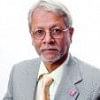The future doesn’t justify the past

In case you have felt the shivers recently, or sweated profusely, know that climate is not the only earthly element that has undergone change. In tandem with erratic rising temperatures and dipping mercury, the favourite pastime of millions (in most languages, it is decried as politics) has gone through momentous transformation for the worst, and in some very unlikely places.
There was a time not so many years ago when some (economically) interested developed country would employ every resource at home and abroad to first criticise, begin policing, then mobilise international media support, create a band of local bootlickers, and finally usurp a head of state of a developing country—someone who was not to their (fiscal) taste.
To help fulfil the unpleasant agenda of the leaders of these developed countries, there were indeed vile, unpopular rulers scattered around the world, who hung on to their "throne" (elected or inherited) by aborting the constitutions, living in lies and, as a last resort, ordering troops to fire on unarmed citizens to quell any uprising.
Even observers on the fence would tell you that Iraq's Saddam Hussein, Libya's Muammar Gaddafi, and now Syria's Bashar al-Assad, North Korea's Kim Jong-un, Belarus's Alexander Lukashenko and such held on to power by guile and gun, though a few are known for their benevolence.
In contrast, the self-assuming darogas of the world were the apparent good guys, upholding the heraldry of democracy. They made it their business to interfere with the internal affairs of another country—all under the pretext of rescuing a people (not theirs) from their avowed tyrannical despot. Often, such tactics in a Western country earned points on the political front.
Unbelievably, actions, trials and even executions in one country are believed to affect elections in another country. If that is what the expression "global village" means, then we are living as rudimentarily as the cave people.
There are examples galore, but a couple of samplers will bring home the argument. The New Yorker in 1996 called him "omnipotent, benevolent, and everlasting President." Captured by the US in 2003, Saddam Hussein was found guilty by Iraqi judges for his violent campaign against the Kurds and the Shias, as well as for crimes against humanity. Rights groups and the United Nations at the time were concerned because Saddam's trial did not meet international standards of fairness. The Iraqi supremo was hanged in 2006.
After leading a military coup in 1969 against the Libyan monarchy, Muammar Gaddafi headed a two-faced Revolutionary Command Council—benevolent towards his people who gained prosperity, but repressive against political opponents. He befriended Nelson Mandela, Fidel Castro, Yasser Arafat, and the Provisional Irish Republican Army. His dream of a common currency for Africa was making headway. In October 2011, the National Transitional Council, backed by the North Atlantic Treaty Organization (Nato) forces, unseated Gaddafi, captured him, and beat him to death. Amnesty International and the Human Rights Watch termed his killing a violation of international law.
If you flip through the pages of photo albums, there could be cuddly images of the leader of a rich democracy and that of a moneywise poorer nation, all smiles, never differentiable by the quality of their clothing. They seemingly fell a world apart due to some not-so-unseen disputes—oil, water, land or trade. But such unscrupulous, power-hungry leadership was no longer the prerogative of only the less developed countries.
In a world-changing scenario, there is little difference today between the leaders of the economically developed and the less developed countries. No one wants to let go of power, even if that means death of democracy. In the poorer countries, such greed has often led to hunger, economic hardship, and sectoral violence.
In at least two of the world's most respected and longstanding democracies, desperate measures to hang on to power by some protagonists have surprised many.
Till it happened in early 2021, no one could have imagined that the US politics would be the cause of political violence. Unlike any of his predecessors, Donald Trump began his acceptance speech long before the elections. Reading his psyche and his encrypted garbled pomposity, the media repeatedly asked him whether he would accept the results. His response every time was feigned efforts to confuse the public—millions loved that.
After the verdict went decisively in favour of Joe Biden by a margin of 306 to 232 electoral votes and 51.3 percent of the popular votes cast—a difference of over seven million—Trump turned his supporters against his chosen running mate, then Vice-President Michael Pence. Trump counted on Republican lawmakers to make one last doomed attempt to reverse the results when Congress met to confirm the Electoral College vote. He called up governors to twist facts and hand him the state votes. When they did not, he made their life hell with threats and mob violence.
Then, on the infamous January 6, a desperate Trump did what was below the ethics of 44 POTUS before him. A rowdy mob of Trump supporters besieged the seat of the US Congress in Washington, DC, seeking to overturn his defeat. No American president had tried so hard to damage the value of democracy and undermine the people's mandate before, and Trump's cult following did not help.
UK Prime Minister Boris Johnson is another "change-maker" without remorse—an inherent leadership quality among many of his predecessors. Police are investigating reports that he and about 30 others were partying at 10 Downing Street when indoor gatherings were banned, and only groups of up to six people were permitted to meet outside under the Covid restrictions in the UK. Singing was prohibited, but they sang to wish him a happy birthday. The leading lawmaker who had made that law broken it.
Boris was brave to say "sorry" in parliament, but indicated he would not resign, which many observers thought was a foregone conclusion, given the country's history of political integrity. Boris was not taught by my Jhenaidah Cadet College teacher, who often reprimanded us with, "Sorry is a cheap word in the dictionary."
Both Trump and Johnson lost high ground. Yet, neither are willing to drop the towel. No one else had remained in contention for a possible second crack at the presidency after so many antiques as Trump. No UK premier has survived lies in the past, but the climate has changed.
They may win back the mandate of the people by hook or by crook, but the future doesn't justify their past.
Dr Nizamuddin Ahmed is an architect and a professor, a Commonwealth scholar and a fellow, Woodbadger scout leader, Baden-Powell fellow, and a Major Donor Rotarian.

 For all latest news, follow The Daily Star's Google News channel.
For all latest news, follow The Daily Star's Google News channel. 



Comments